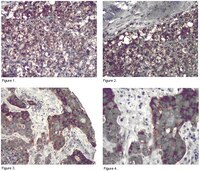Promising developments in targeted therapies for non-small-cell lung cancer.
Desirée Hao,Manuel Hidalgo
Clinical lung cancer
4
2002
Pokaż streszczenie
Despite advances in chemotherapy, radiation therapy, and surgery, the overall survival for patients with lung cancer remains poor. Thus, novel therapeutic approaches are warranted. As knowledge of the molecular abnormalities and dysregulated cellular processes contributing to the pathogenesis and progression of lung cancer has been acquired, intense interest has been directed at developing agents that target these abnormalities. New agents targeting aberrant receptor tyrosine kinases, the Ras oncoprotein, mediators of metastases and angiogenesis, and the tumor suppressor gene p53 have, among other agents, shown promise in preclinical studies. Early clinical trials with these agents in patients with advanced malignancies suggest preliminary evidence of clinical activity and possible applications in non-small-cell lung cancer (NSCLC). Ongoing clinical trials will help clarify the settings in which these agents are of greatest therapeutic value, the optimal schedule of administration, toxicities associated with chronic administration, and hopefully, provide additional insight into the biology of lung cancer. Selected clinical trials will be presented to highlight the use of rationally designed, targeted therapies for patients with NSCLC. | 14653868
 |









